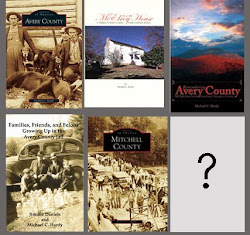For the past couple of days, I've been reading up on the convict labor system in regards to Mitchell County. I came across a great photograph of some convicts working on a road, probably the road between Toecane and Burnsville; I plan to use the image in the Mitchell County book.
Many are probably not aware of the program used in the 1920s where convicts from the state prison system were used to construct roads in the area. Awareness of the program probably comes from the Race Riot in Spruce Pine in 1923. (Or from movies, like O Brother, Where art Thou? and The Shawshank Redemption!)
It appears that the program of leasing out convicts started not long after the end of the Civil War. The convicts were leased to private companies that paid the state for their services. The convicts worked during the day, and then returned to their cells in the evening. According to the book Slavery and the Penal System, the sole aim of the system was the "financial profit to the lessees who exploited the labor of the prisoners to the fullest, and to the government which sold the convicts to the lessees." Convicts were used to supply labor in the railroad, mining, farming, and logging operations. This system was slowly fazed out in the early 20th century and replaced with the Trusty system (not to be confused with Mississippi's Trusty system). Convicts who had served a significant portion of their sentences, and who were well behaved, were designated as trustees. In Mitchell County there wasa "prison" camp for trustees. The convicts worked on the roads during the day and returned to the camp in the evenings. Most, if not all of the convicts used in this program were Americans of African descent.
It is believed that the Fisk Carter Construction Company used such laborers, as did the Clinchfield Products Corporation, the Porter and Boyd Construction Company, and the C. H. O'Brian Construction Company. Fisk Carter was engaged in laying water and sewer lines in Spruce Pine. Those who worked for Clinchfield were mining kaolin and feldspar. Porter and Boyd, and O'Brien, were both working on the roads. There was also a state highway project in Avery County.
There were undoubtably other companies with the Toe River area that used convict labor. This is a topic that deserves more investigation.
Thursday, May 29, 2008
Subscribe to:
Post Comments (Atom)



No comments:
Post a Comment